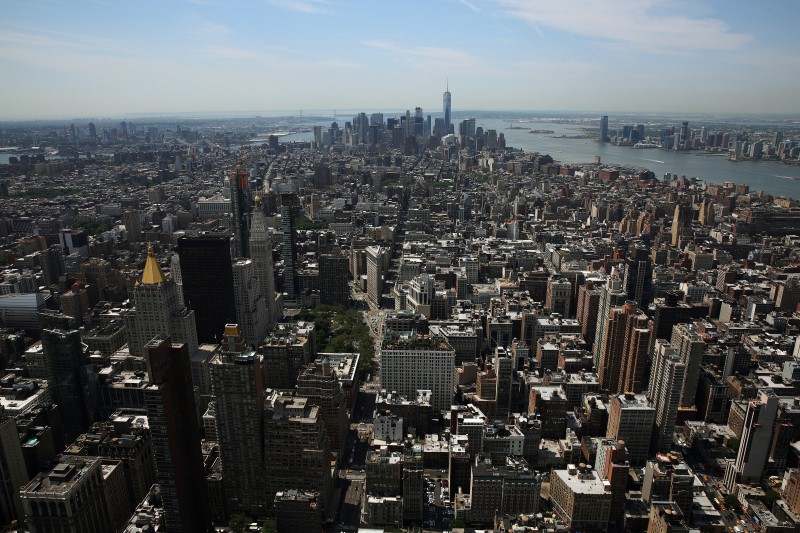(Bloomberg) -- Foreign investors who backed real estate projects in return for U.S. visas are emerging as losers in the pandemic-driven commercial property crisis.
In Manhattan, Chinese investors who helped fund Related Cos.’ Hudson (NYSE:HUD) Yards have called for arbitration to pressure the developer into returning their money. On Long Island, a separate group assumed the lease to the Nassau Coliseum, after billionaire Mikhail Prokhorov’s Onexim Sports and Entertainment decided to walk away from the project.
The investors, who backed development deals through the U.S. Citizenship and Immigration Services’ EB-5 program, aren’t the only ones getting hammered by the Covid-19 pandemic, which has kept mall-goers, hotel guests and office workers home, pushing commercial-property owners into delinquency. But EB-5 investors, who cared more about coming to the U.S. than financial returns, have less leverage than most.
“Cash is king during Covid, and developers are reluctant to let go of any cash,” said Mona Shah, a New York lawyer who works on EB-5 deals. “It doesn’t help that there are some developers who show distinct lack of respect for EB-5 money. It’s easy money.”
Real Estate Investors Skip Paying Loans While Raising Billions
Shah said she represents a hotel developer who is looking to reduce the principal owed on an EB-5 loan, because the property closed due to the pandemic and is unlikely to return to profitability quickly. In other cases, developers are seeking to extend loan terms or withhold payments entirely, Shah said.
No Timetable
At Hudson Yards, roughly 2,000 EB-5 investors poured $1 billion into the Manhattan project through a series of deals, according to a demand for arbitration filed recently by Chicago lawyer Doug Litowitz. The investors were unsophisticated about U.S. real estate, according to Litowitz, and were told by the Chinese firm that helped Related raise money that they would be repaid following approval of their work visas, known as green cards.
But the funding was structured as a preferred equity investment, not a loan, and there was no fixed timetable for returning the money. After Neiman Marcus Group Inc., the luxury retailer that was the anchor of the upscale mall at Hudson Yards, declared for bankruptcy, Litowitz asked Related to tell his clients when they could expect to get their money out of the project. He also asked the developer to open its books so his clients could determine whether the pandemic had diminished the value of their investment.
“The Related deal is interesting because the terms given to the Chinese are so bad that it’s almost like a test case for how bad a structure can be and still be legal,” said Litowitz, whose brother Alec is the chief executive officer of hedge fund Magnetar Capital. “Dostoyevsky said, ‘If murder is allowed, everything is allowed.’ That’s how I feel about this case.”
Related has been unmoved by those requests.
“Financial investment returns are a function of the market economy and obviously this is a challenging time,” Related spokesman Jon Weinstein said in an email. “We were off to a good start, but now we need to be patient.”
EB-5 was a sleepy program until the 2007-2008 financial crisis, when developers like Related looked overseas to replace traditional financing sources. They found a bonanza: foreign investors who viewed U.S. real estate as a safe asset and were principally concerned with obtaining visas, meaning they were willing to accept returns as low as 1% and sometimes less.
The program, which provided visas to foreign investors who sank at least $500,000 into U.S. projects that created at least 10 jobs, was meant to promote investment in rural areas, as well as urban locales with high unemployment. But gerrymandered districts allowed EB-5 funding to flow to developments like Hudson Yards and an Extell Development Co. tower on Manhattan’s Billionaire’s Row.
Wild West
Roughly $36 billion in EB-5 capital flowed into the U.S. from 2010 to 2019, according to estimates from Invest In the USA, a trade group, though the program has become less popular as the backlog of applications grew and the investment threshold increased.
The program attracted scrutiny when Kushner Cos., the developer formerly run by Jared Kushner, who is President Donald Trump’s son-in-law, sought EB-5 funds from Chinese investors.
It also gained a reputation as a Wild West, rife with false promises and conflicts of interest. Theoretically, lending money to big projects should have been more solid, but even marquee developers haven’t been shielded from the pandemic.
Billionaire Prokhorov to Close Long Island’s Nassau Coliseum
As Covid-19 cases surged through the New York City area this spring, Prokhorov’s Onexim canceled sporting events and concerts at the Nassau Coliseum. By June, the company decided that the pandemic had made the events business unappealing, and signaled its intention to hand the arena lease over to lenders.
On Aug. 20, Nassau County announced a deal with the U.S. Immigration Fund, which funneled EB-5 capital into renovations at the arena. As part of the agreement, an affiliate of the EB-5 group assumed the lease, promising to operate the building so the National Hockey League’s New York Islanders could eventually return to the ice.
Maureen Hanlon, CEO of Nassau Events Center, which had operated the building for Onexim, said she was sorry to abandon the arena, but happy to reach an agreement that allows “the county to receive its rent and, most importantly, for the fans to have a functioning arena as soon as health guidelines allow.”
Gary Friedland, who has studied the program as a scholar-in-residence at New York University’s Stern School of Business, expects that plenty of other borrowers will walk away from an EB-5 projects in the months to come.
“For years, I’ve predicted there would be a flood of defaults,” Friedland said. “It’s risky capital. If there’s a reduction in values, it’s going to get hit.”
©2020 Bloomberg L.P.
